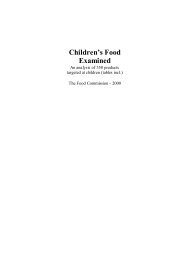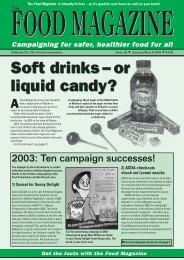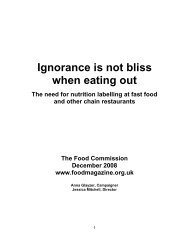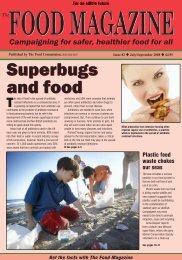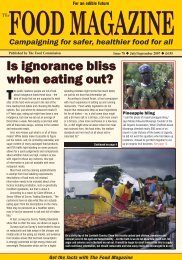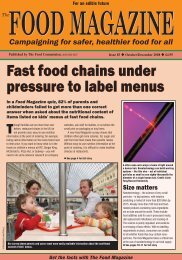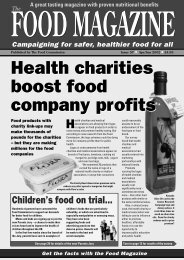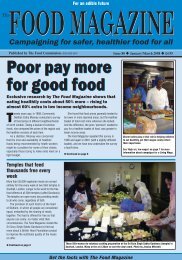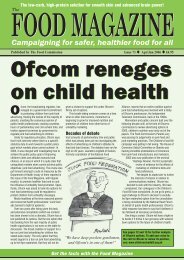Children's Nutrition Action Plan - The Food Commission
Children's Nutrition Action Plan - The Food Commission
Children's Nutrition Action Plan - The Food Commission
You also want an ePaper? Increase the reach of your titles
YUMPU automatically turns print PDFs into web optimized ePapers that Google loves.
Tim Marsh<br />
UK Public Health Association<br />
Note: prior to his appointment with the UK Public Health Association, Tim Marsh worked for<br />
Child Poverty <strong>Action</strong> Group on their School Meals Campaign. His presentation at the<br />
Children’s <strong>Nutrition</strong> <strong>Action</strong> <strong>Plan</strong> meeting focused on that campaign.<br />
One in three schoolchildren in the UK – around 2.8 million – currently live in poverty. Yet<br />
only about 1.8 million children are entitled to a free school meal.<br />
Who is entitled to free school meals?<br />
• All children whose parents are in receipt of income support or income based Jobseeker’s<br />
Allowance are entitled to free school meals<br />
• 1.8 million children in the UK, of which 1.4 million children are in England (18%)<br />
Of the 1.8 million children eligible for free school meals, around 300,000 (20 per cent), for a<br />
variety of reasons, do not take up their entitlement. <strong>The</strong>re are, therefore, around a million<br />
children living in poverty who do not get a free school meal.<br />
Every child, irrespective of income level, should have access to a satisfying and nutritious<br />
meal during the school day. As this publication shows, many children are missing out on this<br />
meal and many low-income families face financial difficulties to ensure their children eat a<br />
proper lunch. Child Poverty <strong>Action</strong> Group believes it is unacceptable to put children and<br />
families in this position and urges the Government to remedy this situation.<br />
In March 1999, in response to both research showing that so many children were missing out<br />
on a vital meal and to the Acheson report on health inequalities, Child Poverty <strong>Action</strong> Group<br />
launched a campaign, ‘Free School Meals for children who need them’.<br />
<strong>The</strong> Child Poverty <strong>Action</strong> Group School Meals campaign has three aims:<br />
• <strong>The</strong> extension of entitlement to free school meals to all families receiving new tax credits<br />
• <strong>The</strong> maximisation of the take up of free school meals<br />
• <strong>The</strong> introduction of minimum nutritional standards for school meals and the development<br />
of nutritional education in schools<br />
In implementing policies to improve the take-up of free school meals, it is vital to tackle the<br />
reasons why take-up remains low. Progressive policies, such as the establishment of<br />
minimum nutritional standards for school meals, will be undermined if a third of a million of<br />
the poorest children do not make it to the dinner queue.<br />
Research shows that there are a number of reasons for the non-take-up of free school meals.<br />
• Stigma<br />
• Quality and choice of food on offer<br />
• Environment<br />
• Awareness of entitlement<br />
In some areas, take-up is worse than others. In some London boroughs over one third of<br />
schoolchildren miss out on a school meal to they are entitled. Secondary schools in the North<br />
<strong>The</strong> Children’s <strong>Nutrition</strong> <strong>Action</strong> <strong>Plan</strong>, published by <strong>The</strong> <strong>Food</strong> <strong>Commission</strong><br />
25



